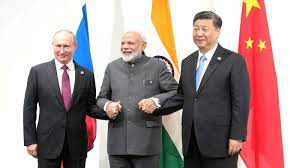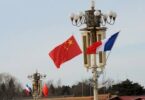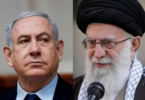David A. Andelman
This might have been an opportunity for world leaders to bridge a host of chasms that are opening up, as G20 conferences have in the past. But now, this upcoming weekend’s G20 gathering in New Delhi seems more likely to widen the gulf between the blocs – east and west, north and south – than at any other point since the Cold War.
Unless this opportunity is well and deftly played. With Russian President Vladimir Putin skipping the meeting and sending his Foreign Minister Sergey Lavrov instead, and China’s Xi Jinping sending Premier Li Qiang in his place, this could be an opportunity for greater unity on key issues for those world leaders still attending. Under an arrest warrant issued in March, following his indictment for war crimes by the International Criminal Court (ICC), Putin is subject to seizure if he sets foot in any of the court’s 123 member states. That said, India is not an ICC signatory. Who knows how Prime Minister Narendra Modi might have reacted to a drop-in from the Russian president – it seems Putin preferred not to find out. There had been considerable hope in some circles that Presidents Joe Biden and Xi would be able to pick up the dialogue the two had begun in Bali, Indonesia, at the last G20 summit in November.
The US has been making a major effort over the last three months to patch up a relationship between the two countries that appeared to be on a downward spiral since a Chinese surveillance balloon flew over America early this year. Over the past three months, the US has sent a blitzkrieg of senior administration officials – three cabinet secretaries and its top climate envoy – in an effort to right the ship.
Yet only Secretary of State Antony Blinken got an audience, albeit brief, with Xi, and then he was shunted to the side as Xi occupied the head of the table, alone. Xi certainly understands optics, of which he is a master. Yet this will be the first G20 that Xi has skipped in the decade he’s served as China’s president. And this demonstrates several huge failings for China and its otherwise astute president. First, China has not reciprocated with a single significant visit to Washington since the spring. Blinken invited his counterpart, but he’s still waiting on a response. On the other hand, Xi does not like to be snubbed himself.
Around the same time word leaked last week that Xi would not be attending the G20, officials close to Biden told NBC that he had no plans to meet formally with Xi at the summit anyway. Hardly an encouragement for Xi to show up and send a message of comity he is not yet ready to convey – but should for a host of reasons. Second, there’s the question of how firmly Xi is casting his lot in with Putin. With the ICC arrest warrant hanging over him, Putin also skipped the in-person BRICS meeting of emerging nations in Johannesburg, South Africa, last month, opting instead for a virtual address (and yet again, sending Lavrov to stand in for him). South Africa, unlike India, is an ICC signatory. But Xi did attend that meeting. His decision to shun the G20 in New Delhi, which could be taken as a direct affront to the host, Indian Prime Minister Narendra Modi, has had some of that edge taken off by the deep tête-à-tête the two had at the BRICS summit.
Still, there does remain so much baggage between India and China that a single session could hardly dispel it all. Just last week, China inflamed matters by publishing a national map that included India’s far north Arunachal Pradesh state, territory also claimed by Beijing. India lodged a “strong protest.” China dismissed the claims. Is Xi skipping the G20 in order to avoid a face-to-face conversation with Biden? The US President on Sunday said, “I am disappointed … but I am going to get to see him,” without elaborating on when that would be. There is still another opportunity for a one-on-one meeting at the Asia Pacific Economic Cooperation (APEC) forum in San Francisco in November – though there’s no guarantee Xi will show up for that, either. But the G20 is about far more than simply China-US relations. India, as G20 host this year, would like the summit to focus on the environment and sustainable development, along with a leveling of the playing field between the rich and poor. Xi perhaps feels that enthusiastically championing the expansion of the BRICS membership – by adding Argentina, Egypt, Ethiopia, Iran, Saudi Arabia and the United Arab Emirates – might take the edge off many of the G20’s priorities since now seven of the 11 expanded BRICS members are in the G20. He’d be wrong, of course. The G20 account for 85% of the world’s economic output, 75% of world trade and contain two-thirds of the global population. By contrast, even BRICS+ accounts for just 36% of global GDP and less than half the population.
China would like to think it has long had a purchase on such issues with its “Belt and Road infrastructure initiative.” Almost 150 countries have joined the project, but increasingly it is being perceived by analysts and the US government as a debt trap or device enabling China to make inroads in parts of the world with resources it covets and where it might otherwise face competition from other developed countries. (China has dismissed these claims.) Even without the leaders of China and Russia, there is still a laundry list of critical issues to discuss at the G20. One.org, the global movement to end extreme poverty, highlighted in a dramatic report for the G20 that much of Africa, drowning in a 500% increase in debt service payments from rising interest rates, needs urgent relief. In some respects, it’s pretty short-sighted for Xi to skip this session – coming at the moment China and its economy need desperately to open up more markets and ties with the world. In July, China’s exports plunged 14.5% from over a year ago, their biggest drop since the initial Covid-19 outbreak. The hope is that, without distractions from the presence of Xi and Putin, the G20 will be able to focus more directly on just such urgent issues. The flip side is whether that leaves the world any safer a place. Certainly, it removes an opportunity to pressure Xi into restraining shipment of technology and equipment to Russia that could help its war in Ukraine.
Moreover, the added perception that China is throwing in its lot with an increasingly isolated Putin does little to boost confidence in China as a trading and manufacturing partner. Biden’s planned visit to Vietnam on his way home can only highlight the alternatives that global businesses have in Asia. This visit is only one part of what appears to be an American effort to paint China ever more firmly into a corner in its own backyard of Southeast Asia. China’s absence from the G20 can only further imprint that perception. So, this G20 – uniquely absent Xi and Putin – is an important opportunity to showcase China’s failings, confirm Russia’s status as a pariah and ratify America’s place as a global leader. It will take grace and a deft hand from Biden. But if successful, he will have solidified his position and that of America as a global leader – and perhaps helped preserve the primacy of democracy.
CNN







